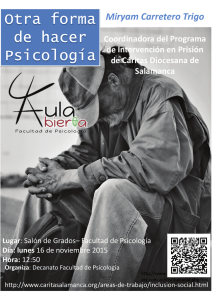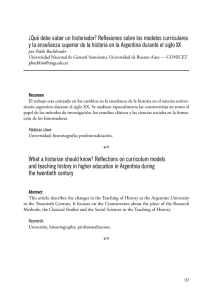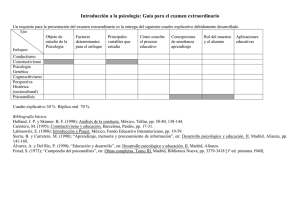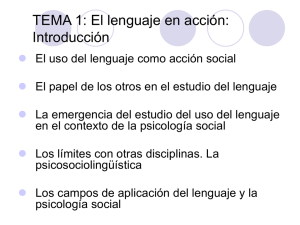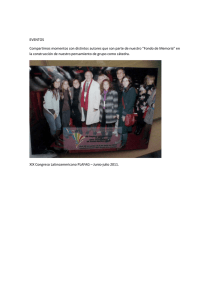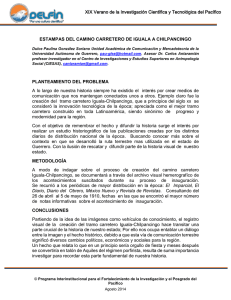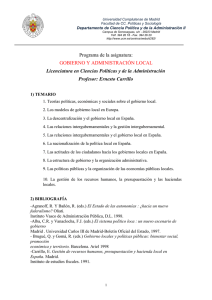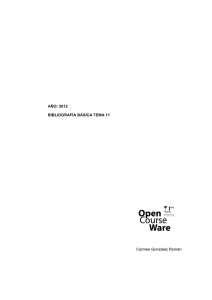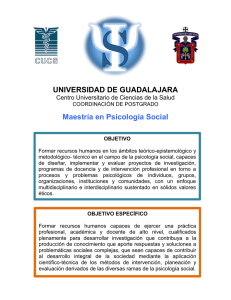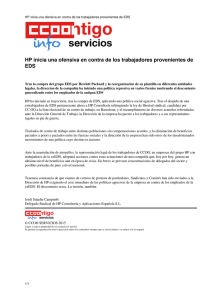Tema: 20. Ciencias experimentales y sociales. 20.2. Bibligrafía
Anuncio
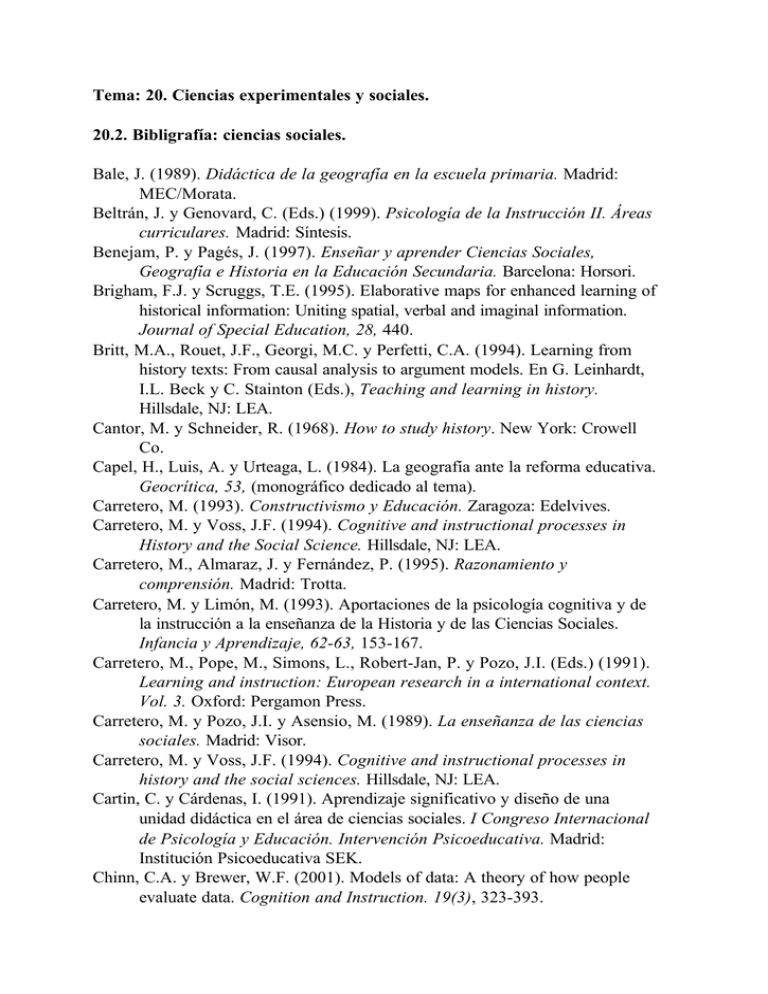
Tema: 20. Ciencias experimentales y sociales. 20.2. Bibligrafía: ciencias sociales. Bale, J. (1989). Didáctica de la geografía en la escuela primaria. Madrid: MEC/Morata. Beltrán, J. y Genovard, C. (Eds.) (1999). Psicología de la Instrucción II. Áreas curriculares. Madrid: Síntesis. Benejam, P. y Pagés, J. (1997). Enseñar y aprender Ciencias Sociales, Geografía e Historia en la Educación Secundaria. Barcelona: Horsori. Brigham, F.J. y Scruggs, T.E. (1995). Elaborative maps for enhanced learning of historical information: Uniting spatial, verbal and imaginal information. Journal of Special Education, 28, 440. Britt, M.A., Rouet, J.F., Georgi, M.C. y Perfetti, C.A. (1994). Learning from history texts: From causal analysis to argument models. En G. Leinhardt, I.L. Beck y C. Stainton (Eds.), Teaching and learning in history. Hillsdale, NJ: LEA. Cantor, M. y Schneider, R. (1968). How to study history. New York: Crowell Co. Capel, H., Luis, A. y Urteaga, L. (1984). La geografía ante la reforma educativa. Geocrítica, 53, (monográfico dedicado al tema). Carretero, M. (1993). Constructivismo y Educación. Zaragoza: Edelvives. Carretero, M. y Voss, J.F. (1994). Cognitive and instructional processes in History and the Social Science. Hillsdale, NJ: LEA. Carretero, M., Almaraz, J. y Fernández, P. (1995). Razonamiento y comprensión. Madrid: Trotta. Carretero, M. y Limón, M. (1993). Aportaciones de la psicología cognitiva y de la instrucción a la enseñanza de la Historia y de las Ciencias Sociales. Infancia y Aprendizaje, 62-63, 153-167. Carretero, M., Pope, M., Simons, L., Robert-Jan, P. y Pozo, J.I. (Eds.) (1991). Learning and instruction: European research in a international context. Vol. 3. Oxford: Pergamon Press. Carretero, M. y Pozo, J.I. y Asensio, M. (1989). La enseñanza de las ciencias sociales. Madrid: Visor. Carretero, M. y Voss, J.F. (1994). Cognitive and instructional processes in history and the social sciences. Hillsdale, NJ: LEA. Cartin, C. y Cárdenas, I. (1991). Aprendizaje significativo y diseño de una unidad didáctica en el área de ciencias sociales. I Congreso Internacional de Psicología y Educación. Intervención Psicoeducativa. Madrid: Institución Psicoeducativa SEK. Chinn, C.A. y Brewer, W.F. (2001). Models of data: A theory of how people evaluate data. Cognition and Instruction. 19(3), 323-393. Delgado López, J.L. (1994-95). La enseñanza de la historia después de la logse. Revista Educativa de la Universidad de Granada, 8, 331-341. De la Fuente, J. y Martínez, J.M. (1999). Programa para aprender a autorregularse durante el aprendizaje. PRO-REGULA. Málaga: Aljibe. Delval, J. (1981). La representación infantil del mundo social. Infancia y Aprendizaje, 13, 35-68. De Vega, M. (1985). Procesamiento de información y cultura. En J. Mayor (Ed.), Actividad humana y procesos cognitivos. Madrid: Alhambra. Echeita, G. (1988). El mundo adulto en la mente de los niños. La comprensión infantil de las relaciones de intercambio. Madrid: Publicaciones MEC. Escoriza, J., González, R., Barca, A. y González, J.A. (Eds.) (1996). Psicología de la Instrucción. Psicopedagogías específicas: áreas curriculares y procesos de intervención. (Vol. 5). Barcelona: EUB. Domínguez, J. (1986). Enseñar a comprender el pasado histórico: conceptos y empatía. Infancia y Aprendizaje, 34, 1-21. Galindo, R., Almohalla, F.M. (1994-95). Los cuadros cronológicos como contenido procedimental. Una propuesta de trabajo. Revista Educativa de la Universidad de Granada, 8, 239-250. García-Raffi, J. (1982). Un enfoque de la enseñanza de la filosofía: los problemas conceptuales. Madrid: MEC. García, F.F. (1990). Didáctica de las ciencias sociales. Geografía e Historia. Estado de la cuestión. Sevilla: Publicaciones de la Universidad de Sevilla. Gil, P. y Piñeiro, R. (1989). Los juegos de simulación en la EGB: una investigación en el área de ciencias sociales. En Carretero, M., Pozo, J.I. y Asensio, M.. La enseñanza de las ciencias sociales. Madrid: Visor. Goldenson, D.R. (1978). An alternative view about the role of the secondary school in political socialization: a field-experimental study of the development of civil liberties attitudes. Theory and Research in Social Education, 6(1), 44-72. Gómez, J.L. (2000). La enseñanza de la historia ayer y hoy. Sevilla: Diada. Graves, N.J. (1982). New Unesco source book for geography teaching. Hong Kong: Longman, The Unesco Press. Hallam, R. (1983). Piaget y la enseñanza de la historia. En C. Coll (Comp.), Psicología genética y aprendizajes escolares. Madrid: Siglo XXI. Leinhardt, G. (1993). Weaving instructional explanations in history. British Journal of Educational Psychology, 63, 46-74. Leinhardt, G. (1994). History: A time to be mindful. En G. Leinhardt, I.L. Beck, y C. Stainton (Eds.), Teaching and learning in history. Hillsdale, NJ: LEA. Leinhardt, G., Beck, I.L. y Stainton, C. (1994). Teaching and learning in History. Hillsdale, NJ: LEA. Leinhardt, G. y Young, K.M. (1996). Two texts, three readers: Distance and expertise in reading history. Cognition and Instruction, 14, 441-486. Liceras, A. (1998). El tratamiento de las dificultades en el aprendizaje de las ciencias sociales. Revista Educativa de la Universidad de Granada, 11, 73-91. Limón, M. y Carretero, M. (1996). Investigaciones psicológicas sobre razonamiento y solución de problemas con contenido histórico. En J. Escoriza, R. González, A. Barca y J.A. González (Eds.), Psicología de la Instrucción, vol. 5: Psicopedagogías específicas: áreas curriculares y procesos de intervención. Barcelona: EUB. Limón, M. y Carretero, M. (1999). Conflicting Data and conceptual change in History Experts. En W. Schnotz, S. Vosniadou y M. Carretero, New Perspectives on Change Conceptual. Ansterdam: Pergamon. Linn, M.C., Songer, N.B. y Eylon, B.S. (1996).Shifts and convergences in science learning and instruction. En D.C. Berliner y R.C. Calfee (Eds.), Handbook of Educational Psychology. New York: MacMillan. Lipman, M. (1985). Thinking skills fostered by phylosophy for children. En J.W. Segal, S.F. Chipman y R. Glaser (Eds.), Thinking and learning skills (Vol. 1: Relating instruction to research.). Hillsdale, NJ: LEA. López, A. (1979).Reflexiones sobre la didáctica de la geografía. Revista de Bachillerato, 9 (enero-marzo). Luria, A.R. (1979). El lugar de la psicología en las ciencias sociales y biológicas. Infancia y Aprendizaje, 5, 56-62. Martín, E. (1983). Jugando a hacer historia: los juegos de simulación como recurso didáctico. Infancia y Aprendizaje, 24, 69-88. Mauri, T. y Valls, E. (2001). La enseñanza y el aprendizaje de la geografía, la historia y las ciencias sociales: una perspectiva psicológica. En Coll, C.; Palacios, J. y Marchesi, A. (Coomp.), Desarrollo psicológico y educación. 2. Psicología de la educación escolar. Madrid: Aliana Editorial. McKeown, M.G. y Beck, I.L. (1990). The assessment and characterization of young learners' knowledge of a topic in history. American Educational Research Journal, 27, 688-726. McKeown, M.G. y Beck, I.L. (1994). Making sense of accounts of history: Why yhoung students don't and how they might. En G. Leinhardt, I.L. Beck y C. Stainton (Eds.), Teaching and learning in history. Hillsdale, NJ: LEA. Orio, B. y Reborias, M.L. D. (1986). El método activo en filosofía. Madrid: MEC. Otero, J. (1996). Components of comprehension monitoring in the adquisition of knowledge from science texts. En K.M. Fisher y M.R. Kibby (Eds.), Knowledge acquisition organization and use un biology. Berlín: NATOSpringer Verlag. Otero, J. (1998). Influence of Knowledge Activation and Context on Comprension Monitoring of Science Texts. En D.J. Hacker, J. Dunlosky y A.C. Graesser, Metacognition and educational Theory and Practice. Mahwah, NJ: LEA. Pagés, J. (1993). Psicología y didáctica de las Ciencias Sociales. Infancia y Aprendizaje, 62-63, 121-151. Pagés, J. y Batllori, R. (1990). El diseño curricular en ciencias sociales. Estado de la cuestión. Boletín de Didáctica. Ciencias Sociales, 1, 9-38. Peraita, H. (1988). La representación del mundo del niño de EGB. Madrid: CIDE. Pérez, T. (1991). Proyecto filosofía 16-18. I Congreso International de Psicología y Educación. Intervención Psicoeducativa. Madrid: Institución Educativa SEK. Piñeiro, M.R. y Gil, P. (1984). Los juegos de simulación en la EGB: Una investigacón en el área de las ciencias sociales. Infancia y Aprendizaje, 27-28, 185-204. Pluckrose, H. (1993). Enseñanza y aprendizaje de la Historia. Madrid: Morata/MEC. Pozo, J.I. y Carretero, M. (1984). Enseñar Historia o contar historias. Otro falso dilema. Cuadernos de Pedagogía, 111, 45-50. Pozo, J.I. y Carretero, M. (1989). Las explicaciones causales de expertos y novatos. En M.Carretero, J.I. Pozo y M. Asensio. La enseñanza de las ciencias sociales. Madrid: Visor. Pozo, J.I., Asensio, M. y Carretero, M. (1986). ¿Por qué prospera un país?. Un análisis cognitivo de las explicaciones en historia. Infancia y Aprendizaje, 34, 23-41. Pozo, J.I., Carretero, M. y Asensio, M. (1983). Cómo enseñar el pasado para entender el presente. Observaciones sobre la didáctica de la historia. Infancia y Aprendizaje, 24, 55-68. Pressein, B.Z. (2000). Procesos cognitivos en el aprendizaje de la historia. En Beltrán, J., Bermejo, V., Pérez, L.F., Prieto, M.D., Vence, D. y González, R., Intervención psicopedagógica y currículum escolar. Madrid: Pirámide. Prieto, M.D. y Hervás, R. (1991). Diseño de habilidades y estrategias de aprendizaje en el área de las Ciencias Sociales. Comunicación presentada en el I Simposium INFAD de Psicología Evolutiva y Edcativa, Alicante. Rivas, F., Latorre, A. y Domenech, F. (1991). MISE. Prueba de un modelo de situación educativa formal en el área de ciencias sociales. I Congreso Internacional de Psicología y Educación. Intervención Psicoeducativa. Madrid: Institución Educativa SEK. Rivera, A. (1999). Procesos cognitivos implicados en las ciencias sociales. En J. Beltrán y C. Genovard (Eds.), Psicología de la Instrucción II: Áreas curriculares. Madrid: Síntesis. Rivera, A. y Beltrán, J. (1991). Un enfoque constructivista en el proceso de enseñanza-aprendizaje de las ciencias sociales: la solución de problemas. I Congreso Internacional de Psicología y Educación. Intervención Psicoeducativa. Madrid: Institución Psicoeducativa SEK. Rodrigo, M.J. (1985). Las teorías implícitas en el conocimiento social. Infancia y Aprendizaje, 31-32, 145-156. Rodrigo, M.J. (2000). Las teorías implícitas en la construcción del conocimiento social. En Beltrán, J., Bermejo, V., Pérez, L.F., Prieto, M.D., Vence, D. y González, R., Intervención psicopedagógica y currículum escolar. Madrid: Pirámide. Santiuste, V. (1984). Didáctica de la filosofía. Madrid: Narcea. Scevak, J.J. y Moore, P.J. (1998). Levels of processing effects on learning from texts with maps. Educational Psychology, 18(2), 133-155. Seixas, P. (1996). Conceptualizing the growth of historical understanding. En D.R. Olson y N. Torrance (Eds.), The handbook of education and human development: New models of learning, teaching and schoooling. Cambridge, MA: Blackwell. Seoane, J. (1985). Conocimiento y representación social. En J. Mayor (Ed.), Actividad humana y procesos cognitivos. Madrid: Alhambra. Stodolsky, S. (1991). La importancia del contenido en las clases de matemáticas y de ciencias sociales. Barcelona: Paidós/MEC. Trepat, C.A. (1995). Procedimientos en historia. Un punto de vista didáctico. Barcelona: Graó/ICE. Turiel, E. (1983). The development of social knowledge. Cambridge: Cambridge University Press. (Traduc. español: El desarrollo del conocimiento social. Moralidad y convención.Madrid: Debate, 1987). Turiel, E., Enesco, I. y Linaza, J. (Comps.) (1989). El mundo social en la mente infantil. Madrid: Alianza Psicología. Varios (1990). Tema del mes: Geografía, Historia y Ciencias Sociales. Cuadernos de Pedagogía, (Febrero), 5-35. Voss, J.F. (1986). Social studies. En R.F. Dillon y R.J. Sternberg (Eds.), Cognition and Instruction. New York: Academic Press. Voss, J.F., Tyler, S.W. y Yengo, L.A. (1983). Individual differences in the solving of social science problems. En R.F. Dillon y R.R. Schmeck (Eds.), Individual Differences in Cognition. New York: Academic Press. Voss, J.F. y Ney Silfies, L. (1996). Learning from history text: The interaction of knowledge and comprehension skill with text structure. Cognition and Instruction, 14(1), 45-68. Voss, J.F., Wiley, J. y Carretero, M. (1995). Acquiring intellectual skills. Annual Review of Psychology, 46, 151-181. Wade, S. (1983). A synthesis of the research for improving reading in the social studies. Review of Educational Research, 53, 461-497. White, J.J. (1981). An etnographic study of the construction of knowledge about different cultures in a elementary school. Dissertation Abstracts International, 41(7), 3041 A. White, J.J. y Rumsey, S. (1994). Teaching for understnading in a third-grade geography lesson. En J. Brophy (Ed.), Advances in research on teaching: Vol. 4. Case studies of teaching and learning in social studies. Greenwich, CT: JAI Press. Wertsch, J.V. y Polman, J.L. (2001). The intuitive mind and knowledge about history. En B. Torff y R.J. Sternberg (Eds.), Understanding and teaching the intuitive mind. Mahwah, NJ: LEA. Wineburg, S.S. (1996). The psychology of learning and teaching history. En D.C. Berliner y R.C. Calfee (Eds.), Handbook of educational psychology. New York: MacMillan. Whitrow, G.J. (1990). El tiempo en la historia. Barcelona: Crítica. Zárate, A. (1995). Estrategias para un aprendizaje significativo de la Geografía en la ESO. Madrid: UNED.
